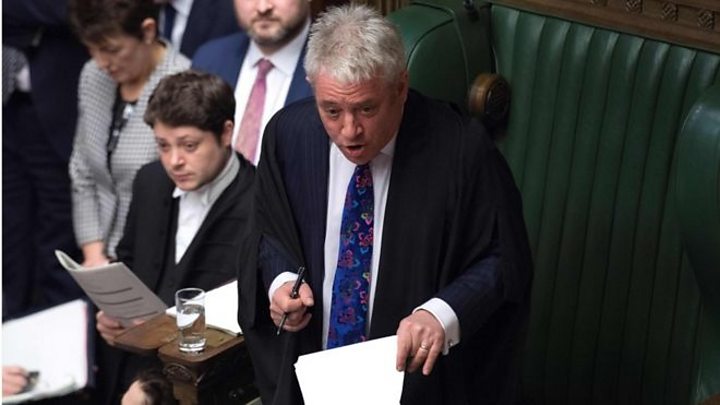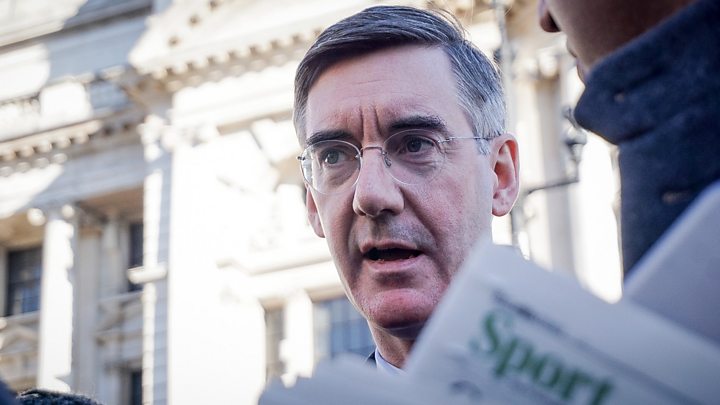
MPs are debating eight proposals on the future of Brexit ahead of votes later on a way forward.
It comes after MPs took control of the House from the government as they attempt to find a majority for the next steps in the Brexit process.
Measures being debated include leaving without a deal, forming a customs union and a confirmatory referendum.
Theresa May is still trying to drum up support for her deal, despite it being voted down by a large margin twice.
But after the Speaker of the House, John Bercow, announced which eight proposals he had chosen for votes, he reiterated his earlier warnings that the PM’s deal could not come back for a vote if it had not significantly changed.
Mr Bercow said the government “should not seek to circumvent my ruling” by introducing procedures that could reverse his judgement.
But a Downing Street spokesman said there had been a “significant development” at the summit in Brussels last week, after Mrs May agreed “extra reassurances” over the Irish backstop with the EU, and the date of exit had changed.
Brexit Secretary Steve Barclay confirmed the government would be tabling a motion later to ensure the Commons could sit on Friday if need be.
Meanwhile, Labour has confirmed it will be backing a motion calling for a confirmatory public vote, saying any deal agreed by Parliament “needs further democratic approval”.
- Live: MPs debate way forward for Brexit
- What are indicative votes?
- How the indicative vote process will work
- Prime Minister’s Questions: The verdict
Earlier, the government ordered their MPs to vote against a business motion securing the indicative votes for this evening, but lost by 331 to 287.
Conservative backbencher Sir Oliver Letwin, whose cross-party proposal ushered in today’s debate, said the only way leaving the EU with no-deal can be prevented is by crystallising an alternative majority and trying to carry it forward.
He said that if MPs supported the prime minister’s deal in another meaningful vote this would be “the easy route”.
But he added that he “profoundly hopes” that if on Monday there is a majority view in favour of a particular position, that the government will say that it will carry that forward.
What options are MPs voting on?
Groups have been putting forward different options for the UK’s future relationship with the EU, with several based on the assumption Mrs May’s withdrawal agreement with the EU will be approved – albeit with changes to the controversial Northern Ireland backstop.
The Speaker of the House, John Bercow, has chosen eight to be voted on by MPs later this evening.
They are:
- No-deal Brexit – Leave the EU on 12 April without a deal – Tory MP John Baron
- Common Market 2.0 – The UK joins the European Economic Area and negotiates a temporary customs union until alternative arrangements can be found – Tory MP Nick Boles
- EFTA/EEA – Similar to Common Market 2.0 but rejects any kind of customs union with the EU and says the Irish backstop must be replaced with alternative arrangements – Tory MP George Eustice
- Customs union – Calls for the UK to negotiate a permanent customs union with the EU after Brexit – Tory MP Ken Clarke
- Labour’s alternative plan – A customs union with the EU and “close alignment” with the single market – Labour leader Jeremy Corbyn
- Revoke Article 50 – Cancel Brexit if the UK gets within days of leaving without a deal. MPs would be asked to vote on a no-deal exit and if they rejected that, Article 50 would be revoked – SNP MP Joanna Cherry
- Confirmatory public vote – Parliament cannot ratify or implement any agreement on the UK’s withdrawal and future relationship “unless and until they have been approved by the people of the UK in a confirmatory public ballot” – Labour MP Margaret Beckett
- Malthouse Plan B – The UK makes its budgetary contributions to the EU to the end of 2020 and agrees with the EU a period of two years in which UK goods have full access to the EU – Tory MP Marcus Fysh
How will the process work?
There will be just under four hours of debate on the different options.
After that, MPs will be given a piece of paper listing the options, and will have to mark each one with a “yes” or “no”.
MPs will use both lobbies for completing the indicative vote ballots.
Voting by paper ballot will take place at about 19:00 GMT, with the results announced by Mr Bercow later that evening.
But the process is likely to continue on Monday as MPs seek to whittle down options which could command majority support in Parliament.
The government has until 12 April to propose a different way forward to the EU if it cannot get the current agreement through Parliament.
Timetable for Wednesday in Parliament
Image copyright
Getty Images
Now: MPs debate the proposals before indicative votes later
19:00: MPs vote with paper and pen for their preferences
19:30: Debate on statutory instrument (SI) bringing Brexit delay into law
21:00: Vote on SI
21:30: The Speaker announces the results of the indicative votes – though he could announce them earlier during SI debate
All times approx
How are MPs likely to vote?
Conservative MPs will be given a free vote, meaning they will be able to support or reject any proposal without pressure from party whips. Cabinet ministers will be abstaining.
The decision followed warnings that more than a dozen ministers might quit if they were told they had to follow party orders.
Labour MPs are being whipped to support the party’s own proposal, as well as Mr Clarke’s motion for a customs union and Mr Bole’s option of Common Market 2.0.
But after confusion earlier on the party’s position, shadow Brexit secretary Keir Starmer confirmed Labour would also back Mrs Beckett’s proposal for any deal to face a confirmatory public ballot.
Mr Starmer told the Commons any deal “needs further democratic approval” before being enacted.
The DUP’s leader in Westminster, Nigel Dodds, co-signed two proposals – one asking for the result of the EU referendum in 2016 to be respected and another backing the Malthouse Compromise.
What is the PM’s next move?
Leader of the House Andrea Leadsom said there was a “real possibility” the PM’s deal could come back for a vote on Thursday or Friday.
And during Prime Minister’s Questions – after being told by her fellow Tory MP Andrew Bridgen that his constituents could not trust her to deliver Brexit – Mrs May said she could guarantee delivering on Brexit if “this week” MPs like him supported her deal.
Friday is the day written into law for the UK to leave the EU, but later MPs will vote on a statutory instrument to confirm a delay – with the earliest Brexit is likely to happen now being 12 April.
Image copyright
Reuters
The BBC’s political editor Laura Kuenssberg said some leading Brexiteers were “tiptoeing their way” towards supporting her plan.
But many want to confirm the support of the Democratic Unionist Party – the 10 Northern Irish MPs that give Mrs May a majority in the Commons – before they agree, or at least appeal to them to abstain from the vote.
The party has urged Tory MPs to “stand firm” in their opposition unless there were “significant changes” – namely to the insurance policy to prevent a hard border returning to the island of Ireland, known as the backstop.

Mrs Leadsom said the government was still in talks to persuade the DUP.
But ex-Foreign Secretary Boris Johnson told the BBC there was “no point” supporting Mrs May’s deal “without any sign the UK is going to change its approach in phase two” of the negotiations – read by Laura Kuenssberg as “if the PM promises to go soon, then she might get my vote”.
UK MPs prepare to vote on breaking Brexit deadlock


